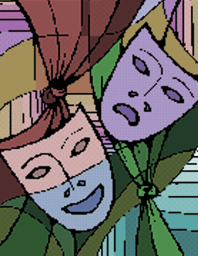Max
Goldmann, the son of a Jewish merchant, is born in Baden, lower Austria
on September 9th 1873 .
As
a young man, he follows an appreniceship in banking; but from age 17 to
19 also takes private acting lessons during his free time.
Thereafter, he plays small
roles in Vienna and throughout Austria, using the stage name Max
Reinhardt.
Later,
in 1894, he joins the German Theater (Deutsche
Theater)
in Berlin where he primarily is cast as an old man.
He
remains there until 1892; but in 1891, together with several colleagues,
also founds the Noise and Smoke (Schall
und Rauch) cabaret.
Ever
successful, in 1903 Max Reinhardt officially assumes direction of both
the Small
Theater (Kleines Theater ) and
the New Theater (Neues Theater),
presently called the Berlin Ensemble (Berliner
Ensemble).
After
1904, his whole family goes by the name Reinhardt.
By now a major personality on
the German theater scene, in 1905 Max Reinhardt is named director of the German Theater
(Deutsche Theater) and, within this
context also founds a school of acting, many of whose students --
including Max Ehrlich, and Ernst Lubitsch --
go on to become international names in theater and film.
His directing style sets a new standard in opera staging, treating the
singers as actors and achieving major breakthroughs in dramatization.
After 1912, his particular style of theater,
which has come to be called Show Theater (Schautheater), also quickly
sets a new standard for the art,
characterized in particular by large scale scenes and enormous stage
sets. His influence by now has
reached worldwide proportions!

